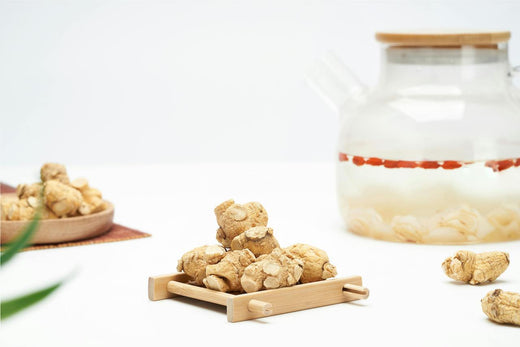One key ingredient in icesupp that provides a source of fibre is inulin, a surprising powerhouse when it comes to nutrition.
In fact, did you know that icesupp contains 2.4g fibre per serving?
Inulin is a type of dietary fibre derived from chicory root. It’s a versatile ingredient and can be added to many foods and supplements to help boost fibre content including bakery, confectionery, dairy products, beverages and seasonings.
Let’s explore the key nutritional features of inulin.
What are the health benefits of inulin?
Promotes digestive health
Inulin is found naturally in various plants and has gained popularity for its potential health benefits, particularly for gut health.
Inulin is a type of prebiotic fibre found in foods like chicory root, garlic, onions, and bananas.
It’s not digested by the stomach or small intestine, but instead, it travels to the colon, where it is fermented by bacteria. This fermentation process encourages the growth of healthy gut bacteria, which is crucial for maintaining a balanced and healthy digestive system.
Studies have shown that regular consumption of inulin can help improve bowel habits, helping to improve consistency and frequency.1,2
Additionally, by helping to influence the gut microbiome, inulin can increase the number of health promoting bacteria and reduce the number of harmful species, reducing the risk of gastrointestinal infections.1
Improves bone health
Another lesser-known benefit of inulin is its potential to improve bone health by helping calcium absorption.3 Inulin enhances the absorption of minerals, particularly calcium and magnesium, in the gut. These minerals are essential for maintaining strong and healthy bones.
Helps regulate blood sugar levels
A recent study in women with Type 2 Diabetes found that supplementation with inulin may help to improve blood sugar control.4 This may be due to inulin delaying gastric emptying, slowing the release of sugar into the bloodstream.4 Also, certain hormones in the gut may be modified due to fermentation of inulin, which produces short chain fatty acids (SCFA) that can affect levels of blood sugar and insulin (insulin is the hormone that regulates sugar levels in the blood, helping to move sugar i.e.glucose, into cells to be used for energy).
Lowers cholesterol levels
Generally speaking, fibre rich diets can help improve our metabolic health. In fact, the government recommends that we eat 30g of fibre a day.5 In particular, inulin has been shown to have a positive impact on heart health by helping to lower low-density lipoprotein cholesterol (LDL-C), often referred to as "bad" cholesterol.6
Is inulin safe to eat?
In some circumstances, consumption of inulin can lead to bloating or diarrhoea in cases of intestinal sensitivity or irritation. For example, in those that suffer with irritable bowel syndrome and are intolerant to FODMAPs.
However, many studies have reviewed the positive impact of insulin, with at least 10g inulin a day which had a notable effect.7
For the majority of people, taking inulin every day is considered safe and can be beneficial, but it may be wise to consult with a dietitian or healthcare professional if you have specific dietary needs or concerns. We also recommend increasing the amount of insulin you eat slowly to help monitor and manage potential side effects.
How can you incorporate inulin into your diet?
Inulin is naturally found in various foods, including garlic, onions, and bananas. It is also available as a dietary supplement and is often added to foods like yoghurts, cereals, and baked goods.
Supplements like icesupp, which are designed to help with your nutrition utilise ingredients like inulin to boost the fibre in every serving.
Inulin is a versatile and beneficial fibre that offers a range of health benefits, from improving digestive health to potentially impacting your bone health. By including inulin-rich foods in your diet or through a supplement, you can top up your fibre intake and take advantage of it’s health properties.
References:
- Roberfroid MB. Introducing inulin-type fructans. British Journal of Nutrition. 2005;93(S1):S13-S25. doi:10.1079/BJN20041350
- Collado Yurrita L, et al. Effectiveness of inulin intake on indicators of chronic constipation; a meta-analysis of controlled randomized clinical trials. Nutr Hosp. 2014 Aug 1;30(2):244-52.
- Abrams SA, et al. An inulin-type fructan enhances calcium absorption primarily via an effect on colonic absorption in humans. J Nutr. 2007 Oct;137(10):2208-12. doi: 10.1093/jn/137.10.2208. PMID: 17884999.
- Pourghassem Gargari B, et al. Effects of high performance inulin supplementation on glycemic control and antioxidant status in women with type 2 diabetes. Diabetes Metab J. 2013 Apr;37(2):140-8.
- NHS. How to get more fibre into your diet. Available online: https://www.nhs.uk/live-well/eat-well/digestive-health/how-to-get-more-fibre-into-your-diet/ Accessed August 2024.
- Guo Z, et al. Effects of Inulin on the Plasma Lipid Profile of Normolipidemic and Hyperlipidemic Subjects. Clin Lipidology. 2012;7(2):215-222.
- Watson AW, et al. Changes in stool frequency following chicory inulin consumption, and effects on stool consistency, quality of life and composition of gut microbiota. Food Hydrocoll. 2019 Nov;96:688-698



